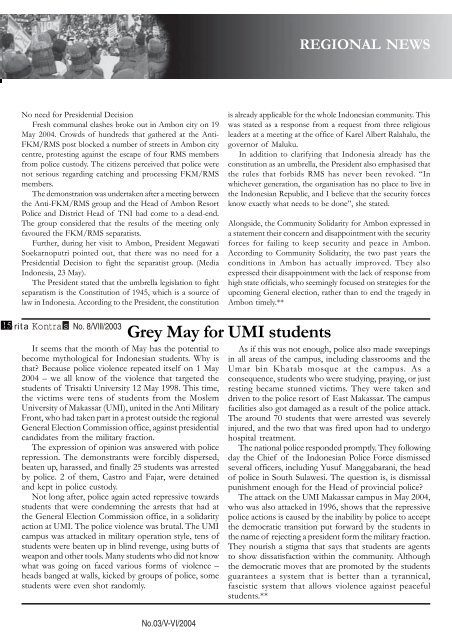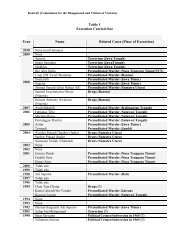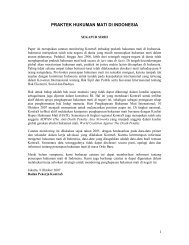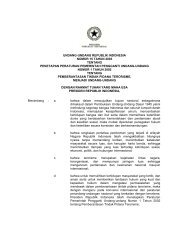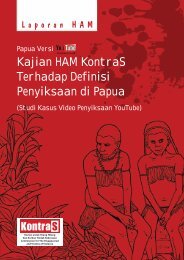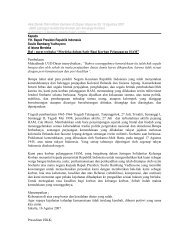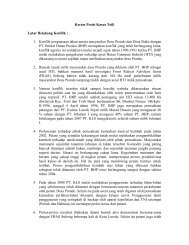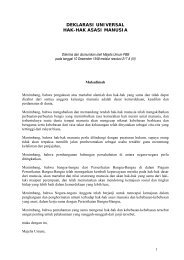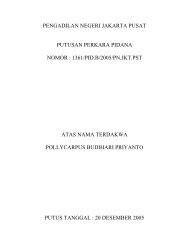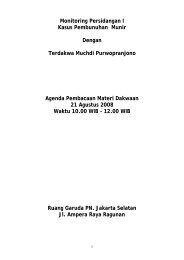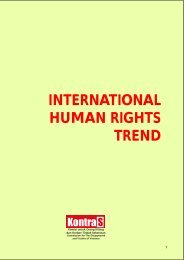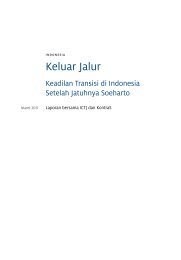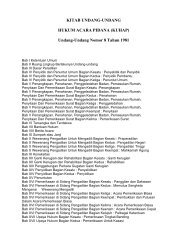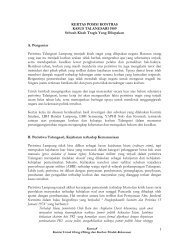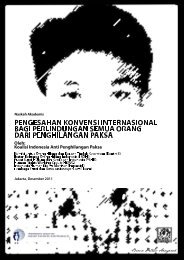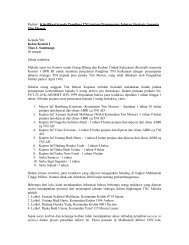buku kontras 1.pmd
buku kontras 1.pmd
buku kontras 1.pmd
You also want an ePaper? Increase the reach of your titles
YUMPU automatically turns print PDFs into web optimized ePapers that Google loves.
REGIONAL NEWS<br />
No need for Presidential Decision<br />
Fresh communal clashes broke out in Ambon city on 19<br />
May 2004. Crowds of hundreds that gathered at the Anti-<br />
FKM/RMS post blocked a number of streets in Ambon city<br />
centre, protesting against the escape of four RMS members<br />
from police custody. The citizens perceived that police were<br />
not serious regarding catching and processing FKM/RMS<br />
members.<br />
The demonstration was undertaken after a meeting between<br />
the Anti-FKM/RMS group and the Head of Ambon Resort<br />
Police and District Head of TNI had come to a dead-end.<br />
The group considered that the results of the meeting only<br />
favoured the FKM/RMS separatists.<br />
Further, during her visit to Ambon, President Megawati<br />
Soekarnoputri pointed out, that there was no need for a<br />
Presidential Decision to fight the separatist group. (Media<br />
Indonesia, 23 May).<br />
The President stated that the umbrella legislation to fight<br />
separatism is the Constitution of 1945, which is a source of<br />
law in Indonesia. According to the President, the constitution<br />
is already applicable for the whole Indonesian community. This<br />
was stated as a response from a request from three religious<br />
leaders at a meeting at the office of Karel Albert Ralahalu, the<br />
governor of Maluku.<br />
In addition to clarifying that Indonesia already has the<br />
constitution as an umbrella, the President also emphasised that<br />
the rules that forbids RMS has never been revoked. “In<br />
whichever generation, the organisation has no place to live in<br />
the Indonesian Republic, and I believe that the security forces<br />
know exactly what needs to be done”, she stated.<br />
Alongside, the Community Solidarity for Ambon expressed in<br />
a statement their concern and disappointment with the security<br />
forces for failing to keep security and peace in Ambon.<br />
According to Community Solidarity, the two past years the<br />
conditions in Ambon has actually improved. They also<br />
expressed their disappointment with the lack of response from<br />
high state officials, who seemingly focused on strategies for the<br />
upcoming General election, rather than to end the tragedy in<br />
Ambon timely.**<br />
15 Kontra s<br />
berita<br />
No. 8/Vlll/2003<br />
It seems that the month of May has the potential to<br />
become mythological for Indonesian students. Why is<br />
that Because police violence repeated itself on 1 May<br />
2004 – we all know of the violence that targeted the<br />
students of Trisakti University 12 May 1998. This time,<br />
the victims were tens of students from the Moslem<br />
University of Makassar (UMI), united in the Anti Military<br />
Front, who had taken part in a protest outside the regional<br />
General Election Commission office, against presidential<br />
candidates from the military fraction.<br />
The expression of opinion was answered with police<br />
repression. The demonstrants were forcibly dispersed,<br />
beaten up, harassed, and finally 25 students was arrested<br />
by police. 2 of them, Castro and Fajar, were detained<br />
and kept in police custody.<br />
Not long after, police again acted repressive towards<br />
students that were condemning the arrests that had at<br />
the General Election Commission office, in a solidarity<br />
action at UMI. The police violence was brutal. The UMI<br />
campus was attacked in military operation style, tens of<br />
students were beaten up in blind revenge, using butts of<br />
weapon and other tools. Many students who did not know<br />
what was going on faced various forms of violence –<br />
heads banged at walls, kicked by groups of police, some<br />
students were even shot randomly.<br />
Grey May for UMI students<br />
As if this was not enough, police also made sweepings<br />
in all areas of the campus, including classrooms and the<br />
Umar bin Khatab mosque at the campus. As a<br />
consequence, students who were studying, praying, or just<br />
resting became stunned victims. They were taken and<br />
driven to the police resort of East Makassar. The campus<br />
facilities also got damaged as a result of the police attack.<br />
The around 70 students that were arrested was severely<br />
injured, and the two that was fired upon had to undergo<br />
hospital treatment.<br />
The national police responded promptly. They following<br />
day the Chief of the Indonesian Police Force dismissed<br />
several officers, including Yusuf Manggabarani, the head<br />
of police in South Sulawesi. The question is, is dismissal<br />
punishment enough for the Head of provincial police<br />
The attack on the UMI Makassar campus in May 2004,<br />
who was also attacked in 1996, shows that the repressive<br />
police actions is caused by the inability by police to accept<br />
the democratic transition put forward by the students in<br />
the name of rejecting a president form the military fraction.<br />
They nourish a stigma that says that students are agents<br />
to show dissatisfaction within the community. Although<br />
the democratic moves that are promoted by the students<br />
guarantees a system that is better than a tyrannical,<br />
fascistic system that allows violence against peaceful<br />
students.**<br />
No.03/V-VI/2004


